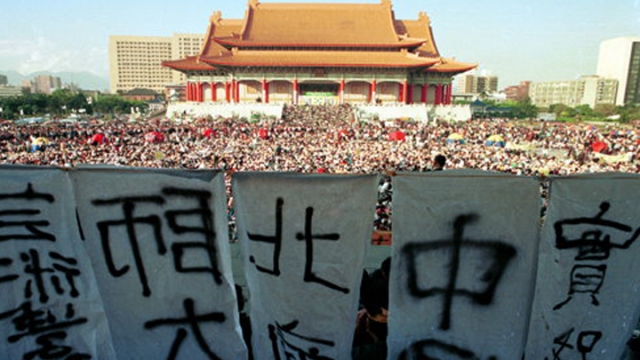The Tian'anmen Square Incident started a wave of democracy that swept across the world. At the end of the 1980's, the people of Taiwan experienced social events such as the lifting of martial law, the 520 Farmers' Movement, and the self-immolation of Cheng Nan-jung (Nylon Cheng). All of this was forming a wave of energy, ready to clash with the system.
In 1990, the 8th presidential election was to be held in the Republic of China. The conservative, "non-mainstream" faction within the dominant Kuomintang (National People's Party, KMT) pushed for Lin Yang-kang and Chiang Wei-kuo as presidential and vice-presidential candidates. In so doing, the non-mainstream faction was clashing with the mainstream faction, which was pushing for Lee Teng-hui and Lee Yuan-tsu as candidates. The incident was known as the "February Political Struggle" at the time. In addition, the president and vice president continued to be elected by the National Assembly. The representatives in the National Assembly had remained in office, uncontested by election, for decades since 1947. This session of the National Assembly was thus derided as the "10,000-year Assembly" and the "Legends in the Mountains", and their decision elicited much public discontent. On March 16th, nine National Taiwan University students staged a sit-in at Chiang Kai-shek Memorial Hall Square (now Liberty Square); they unveiled a banner stating "How Could We Tolerate the Oppression of 700 Emperors Anymore?!", and demanded that the "10,000-year Assembly" be reformed. From this moment, the Wild Lily student movement officially began, also forming the first post-war large-scale student movement in Taiwan.
By March 18th, students from all over the country were arriving to show their support; more than 1,000 joined the sit-in. The movement's four main demands were formally established: Dissolution of the National Assembly; abolition of the Temporary Provisions Effective During the Period of National Mobilization for Suppression of the Communist Rebellion (the "Temporary Provisions"); convening of a National Affairs Conference; and to set a timetable for political and economic reforms. On March 19th, the students resolved to make the wild lily the spiritual symbol of the student movement, because of the flower's grassroots nature, vitality, purity, and nobility.
Facing the large number of student sit-in protests, the Office of the President announced on March 20th that Lee Teng-hui had decided to convene a National Affairs Conference and established a timetable for democratic reforms. On the 21st, Lee Teng-hui, who had just been elected as the 8th president, met with 53 representatives of the student movement at the Office of the President and responded to their demands. The next day, the students officially released a statement entitled "Never Slacken in the Pursuit of Democracy", announcing that they would leave Chiang Kai-shek Memorial Square, and began to disperse.
On June 28th, Lee Teng-hui held the National Affairs Conference at the Grand Hotel in Taipei. A total of 141 delegates attended the conference, including senior KMT government officials; people sentenced in the Formosa Incident; Democratic Progressive Party leaders; and overseas blacklisted individuals. The meeting finally reached a consensus to "end the Period of National Mobilization for Suppression of the Communist Rebellion"; "return to the Constitution"; "abolish the Temporary Provisions"; "amend the Constitution with a 'one-body, two-stage' approach" (that is, amending the National Assembly in two stages); and "amend the Constitution under the name 'Additional Articles of the Constitution of the Republic of China'." In 1991, Lee Teng-hui announced the abolition of the Temporary Provisions, and implemented re-election of the National Assembly delegates. In 1996, Lee Teng-hui and Lien Chan won Taiwan's first direct presidential election, launching Taiwan into a new phase of democratization.
The Wild Lily student movement has been regarded as a key movement in Taiwan's democratization process, and had a profound impact on 2008's Wild Strawberries Student Movement and 2014's Sunflower Student Movement. Many of the student leaders from that time are still working in the political, academic, and social movement fields. Democratic Progressive Party political figures including Fan Yun, Cheng Wen-tsan, Lin Chia-lung, and Cheng Li-chun are all key figures from the "Wild Lily Generation".
References: [端傳媒("Initium Media")(Chinese)] (https://theinitium.com/project/20200316-taiwan-wild-lily-30/); [中央廣播電台("Radio Taiwan International")(Chinese)] (https://www.rti.org.tw/radio/programMessageView/id/102514); [苦勞網("Coolloud Collective")(Chinese)] (https://www.coolloud.org.tw/node/70488); [歷史學柑仔店("Kám-Á-Tiàm Forum of History")(Chinese)] (https://kamatiam.org/看見野百合學運世代崛起/); [BBC中文網("BBC News Chinese Edition")(Chinese)] (https://www.bbc.com/zhongwen/trad/china/2014/03/140322_ana_compare_movement)
